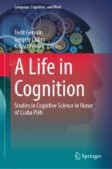Search
Search Results
-
Partiality and Meaning
Why do relationships of friendship and love support partiality, but not relationships of hatred or commitments of racism? Where does partiality end...
-
Ataraxia and Metriopatheia: The Engaged Life of a Pyrrhonist
This chapter explains the notions of ataraxia and metriopatheia that are the skeptic’s goals (PH 1.25–30). According to a widespread interpretation,...
-
Non-supernaturalism: Linguistic Convention, Metaphysical Claim, or Empirical Matter of Fact?
This paper examines our pre-theoretic conception of non-supernaturalism; the thesis that all that exists is natural. It is argued that we intuitively...
-
A Prussian Wittgenstein and a Viennese Kant?
Since Erik Stenius Stenious, Erik made a case for viewing the early Wittgenstein as a Kantian philosopher in 1960, the question whether there is...
-
Global Media Ethics and the Covid-19 Pandemic
This chapter presents an exploration of ethical issues arising in the news media coverage of the Covid-19 pandemic. This chapter is about key ethical...
-
Why Naturalism cannot (Merely) be an Attitude
Varying forms of ontological and methodological naturalism are among the most popular theses in contemporary philosophy. However, each of these...
-
The Continuity of Davidson’s Thought: Non-reductionism Without Quietism
This chapter focuses on the continuity of Davidson’s thought. My goal is to show that two commonly held conceptions of Davidson’s philosophy, one to...
-
The Post-Cartesian Blunder, and the Failure to Develop Philosophy as Critical Fundamentalism
How can the world as it appears to us, the world we live in, exist and best flourish embedded as it is in the physical universe? That is our...
-
Why Should We Help the Poor? Philosophy and Poverty
One might question whether we need ethics at all in the debate on global povertyPoverty, or whether the demand to help seems self-evident and the...
-
You ought to have known: positive epistemic norms in a knowledge-first framework
There are two central kinds of epistemological mistakes: believing things you shouldn’t, and failing to believe things that you should. The...
-
Acceptance and the ethics of belief
Various philosophers authors have argued—on the basis of powerful examples—that we can have compelling moral or practical reasons to believe, even...
-
Transcendental Arguments in Scientific Reasoning
Although there is increasing interest in philosophy of science in transcendental reasoning, there is hardly any discussion about transcendental...
-
Transcendental Proofs and Indubitability
As has already been noted, the permanence of the subject, which is Kant’s point of attack, remains unargued for in the Meditations until the argument...
-
Having a disagreement: expression, persuasion and demand
It is common to distinguish between disagreement in the state sense (being in disagreement) and disagreement in the activity sense (having a...
-
Knowledge from a Human Point of View
Everything that is known by human beings is known from a human point of view. There is no other point of view from which human beings can know...
-
Motivating (Underdetermination) Scepticism
The aim of this paper is to analyse and develop how scepticism becomes an intelligible question starting from requirements that epistemologists...
-
Rorty’s Early Philosophical Papers (1955–1972)
The roots of Rorty’s mature philosophy are explored in a discussion of his early philosophical papers and reviews. His lifelong interest in...
-
‘Animals run about the world in all sorts of paths’: varieties of indeterminism
In her seminal essay ‘Causality and Determination’, Elizabeth Anscombe very decidedly announced that “physical indeterminism” is “indispensable if we...
-
Memory Skill: The Proceduralization of Declarative Memory Through Retrieval Practice
Two outstanding achievements of experimental memory research over the past fifty years have been the description of multiple memory systems and the...
-
Relief, time-bias, and the metaphysics of tense
Our emotional lives are full of temporal asymmetries. Salient among these is that we tend to feel differently about painful or unpleasant events...
